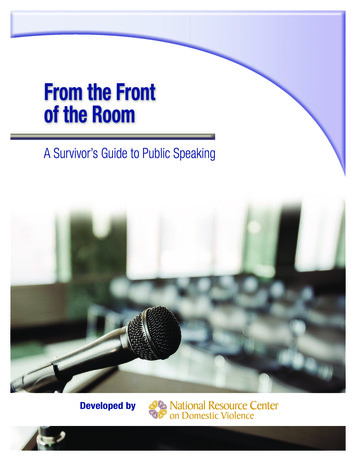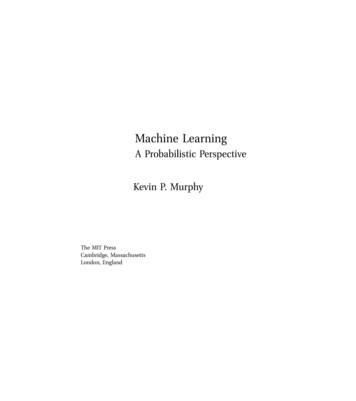
Transcription
The NRCDV provides a wide range of free, comprehensive, and individualized assistance,training, and specialized resource materials and projects designed to enhance currentdomestic violence intervention and prevention strategies. To suggest other resources forthis Guide or for ongoing technical assistance and resources, please contact the NRCDV’sTechnical Assistance Team at 800-537-2238, TTY: 800-553-2508, nrcdv@nrcdv.org, or via ouronline TA form at www.nrcdv.org/TArequest.php.Funding and DisclaimerFunding provided by a grant from the Administration for Children and Families, U.S.Department of Health and Human Services (HHS) Grant #90EV0374The contents of this publication are solely the responsibility of the authors and do notnecessarily represent the official views of the HHS.Permission to ReprintWe encourage you to use, share, and adapt this material as best suits your needs. Whendoing so, please include the following acknowledgement:“This material was reprinted/adapted from the publication titled, From the Front of theRoom: A Public Speaking Guide for Domestic Violence Survivors & Advocates (September2011) by the National Resource Center on Domestic Violence (NRCDV).”National Resource Center on Domestic Violence3605 Vartan Way, Suite 101 Harrisburg, PA 17110Phone: 800-537-2238 TTY: 800-553-2508 Fax: 717-545-9456
AcknowledgementsSpecial thanks are due to Heidi Notario-Smull, NRCDV Training Specialist, Patty Branco, NRCDV TASpecialist, and Kenya Fairley, NRCDV Program Director for their diligent and thoughtful writing,organizing, and editing of this final edition of the speaker’s guide. We also gratefully acknowledgeLaurie Jorgensen, former NRCDV TA Specialist, for sparking the idea to create a guide of this natureand for its initial drafting. Thank you also to Casey Keene, VAWnet Project Manager and RebeccaBalog, WOCN Project Specialist for reviewing the guide and to Erica Keim, NRCDV Project Assistantfor its layout, design, and styling.The National Resource Center on Domestic Violence extends special thanks to the many advocatesand organization staff who contributed and reviewed text for this guide.Andrea Bible – Special Projects Coordinator, National Clearinghouse for the Defense ofBattered WomenNancy Durborow, ConsultantMaurice Hendrix – Violence Intervention Program Coordinator, Arlington County Department ofHuman ServicesBrian Namey – Communications Advisor, National Resource Center on Domestic Violence(Former Communications Director with the National Network to End Domestic Violence)Denise Scotland – Technical Assistance Specialist, Pennsylvania Coalition Against Domestic ViolenceNancy Smith – Director, Center on Victimization and Safety, Vera Institute on JusticeJackie Stutts – Training & Technical Assistance Specialist, Pennsylvania Coalition AgainstDomestic Violence.Ann Turner – Elder Victim Services and AdvocacyCoordinator, National Clearinghouse on Abuse inLater Life / Wisconsin Coalition Against DomesticViolenceRob Valente – Legal Counsel, National Council ofJuvenile and Family Court JudgesPublished September 2011Table of ContentsIntroductionPurposeTips for SurvivorsIn Conclusion681021
IntroductionIncluding the voices and real life experiences of survivors is crucial to our work to endintimate partner violence and abuse in later life1 at the local, state and national level. Hearingdirectly from survivors about their experiences and the impact of domestic violence on theirlives can inspire and energize others to act, as well as help reduce or remove barriers facedby survivors and their children. For survivors interested in sharing their story, public speakingcan connect them in important ways to the larger domestic violence intervention andprevention efforts in their community and across the country. Opportunities for survivors toshare their stories may include: Presenting to community groups at public awareness eventsFor the purposes of this publication, the term “Survivor Speaker” will be used torefer to any survivor of domestic violence, adult exposed to domestic violenceas a child, a victim of elder abuse or neglect, or a surviving family member ofdomestic violence homicide victims who wish to speak out and share howdomestic violence has impacted their lives, family, and community. Survivorspeakers can be female or male, adults of any age, of any race or ethnicity, fromany faith or religious tradition, and diverse in a myriad of other ways. Speaking before state and local government in support of legislation to enhanceprotections for victims of domestic violence Participating in magazine, television or newspaper interviews (anonymouslyif desired) Joining candlelight vigils, marches, rallies, or speaking at a memorial eventfor victims Being part of a domestic violence program’s fund raising event Talking with a program’s Board of Directors or agreeing to have their story includedin the annual report of a local, state or national domestic violence organizationNOTE: This Guide often refers to victim/survivors as women victimizedby male partners or ex-partners, since women disproportionatelyrepresent domestic violence victims. However, men abused by femalepartners and men and women abused in same-sex relationships alsohave important stories to tell and deserve both opportunities andsupport as public speakers. Speaking at life skills development groups, parenting classes, asset buildingworkshops or other types of empowerment groups for survivors Providing encouragement during a victim’s support group Being featured as a keynote speaker at a conference or Domestic ViolenceAwareness Month event16Domestic or Sexual Abuse in Later Life is abuse perpetrated on victims who are 50 years and older by someonewith whom they have an ongoing relationship where there is an expectation of trust such as an intimate partner,adult child, other family member or a caregiver.7
PurposeFrom the Front of the Room (Guide) provides a basic overview of the issues that facesurvivors who desire to speak publicly about their experiences with intimate partnerviolence. It provides guidance for the survivor speaker to maximize their physical andemotional safety and ensure the overall success of the speaking engagement. This Guide isdesigned to explore the journey of sharing their story with the public.While every situation is different, the guidelines, considerations, and ideas that follow canhelp ensure that your public speaking opportunity is as safe and informative as possible. TheNational Resource Center on Domestic Violence (NRCDV) welcomes any feedback readershave to enhance the guidance and resources provided here.“Ican remember watching fascinatedas our mother talked with her mother,sisters, and women friends. Theintimacy and intensity of their speech—the satisfaction they received fromtalking to one another, the pleasure,the joy. It was in this world of womanspeech, loud talk, angry words, womenwith tongues quick and sharp, tendersweet tongues, touching our worldwith their words, that I made speechmy birthright—and the right to voice,to authorship, a privilege I would notbe denied.”bell hooks, Talking Back (1989)8
Tips for Survivor SpeakersAs a survivor, are you considering if, how, and when to share your story with the public?Do you wonder what it would be like to step into the role of a public speaker? This sectionincludes frequently asked questions and tangible steps that can help you make some ofthese decisions and develop a plan for sharing your story if you decide to do so.Am I ready to start telling my story?There are several considerations that can inform a Survivor Speaker’s decision to tell herstory publicly. Issues related to safety, physical and emotional well-being, and the overallimpact on others of sharing a personal story all deserve attention. Questions such as, isit safe to share my story publicly? Do I really want to share my story or am I feeling that ISHOULD? Who could help me figure this out? These are some of the points we encourageyou to consider as you decide whether or not to share your experiences with others ina public forum. Sorting through these questions can be challenging. However, victimadvocates, other survivor speakers, and often family and friends can help inform yourdecision. Keep in mind that while others could provide you with support during this process,it is ultimately your personal decision to take this step.How might telling my story impact my safety andwell-being, my children and others I care about?Impact on your emotional well-beingSpeaking about traumatic events that you have experienced may produce strongemotional and physical reactions for you. While many survivors feel strong andempowered after telling their story, some survivor speakers also describe beingexhausted and emotionally spent after public speaking events. Some have hadflashbacks and nightmares or experience depression in the hours and days aftersharing their story. Some have also experienced physical symptoms, such asheadaches or stomachaches after presentations. Others have noted how helpful itwas to have someone supportive at the presentation or later in the day when they10returned home. Some survivors prefer to clear their schedule before and/or afterthe event to allow adequate time for processing and reflection. Others plan self-careactivities such as being with family and friends, spending quiet time, or going for awalk.Impact on children: respecting your children’s boundariesDepending on their ages, your children may or may not be aware of many of thedetails of the abuse you experienced. As you contemplate whether or not to tellyour story publicly, consider how your children might feel about you bringing thisinformation out into the public arena. Even if they do know the details, hearingabout the events again may be embarrassing or upsetting to them. If the person whoabused you is also their parent, ask the children how they feel about you sharing thatstory with strangers. Usually, there are aspects of your story that can be shared evenif you leave out specific details that your children wish to keep private.Ongoing risks from the person who abused youRemember that the person who abused you, or his/her friends and family, may hearabout your presentation. As you think about whether you are ready to become asurvivor speaker, consider whether it is safe for you to do so. Some survivors whohave publicly shared their stories were stalked or threatened by their former partnereven though the relationship had ended years ago. Some abusers have threatened tosue organizations that have asked the victim of their abuse to speak. If you have anyconcerns about current or future safety risks, explore these with an advocate andreview the guidance in this guide.NOTE: There may also be a potential impact on family members, friends, co-workers, andcommunity in general of telling your story. Think about some possible scenarios as youare preparing and “walk through them.” For example, your family and/or friends may besurprised to learn about your abuse, or upset that you never told them about it. They mayfeel that you should not be telling “family secrets.” The victim advocate working with youwould be an important source of support while assisting you with this process.11
TIPI am ready to share my story. What’s the first step?If you have a pending legal case, such as child custody or divorce proceedingsthat involve the person who abused you, be mindful of how information that you mightshare as a survivor speaker could be used as evidence.We recommend that survivors with an open court case not share their storypublicly – the unintended consequences for you or your children could betoo great.Domestic violence victim advocates play a crucial role in empowering survivors who areexploring the possibility of becoming public speakers. Building a relationship with advocatesin the community has benefits on many levels:Networking OpportunitiesMost local programs have a variety of volunteer opportunities2 that assist survivorsin making connections with victim advocates and other survivors. Some havesocial action groups or caucuses of survivors who meet regularly, lead communityawareness activities or act as a speaker’s bureau for the agency. This might be a goodplace to find opportunities to talk with other survivors about their public speakingexperiences. When community agencies are seeking information about domesticviolence speakers for events, they are likely to contact the local domestic violenceprogram for recommendations.Visualize a Positive OutcomeAs you consider whether to become a survivor speaker, take time to visualize aspeaking event unfolding in the way you want it to and the ways that it might makeyou feel strong and grounded. Remember all of the ways that you have been creativeand resilient in your journey of survival, and imagine how inspired you and others willfeel after you finish sharing your story. Many survivors have made use of a personal,encouraging mantra, a passage from a faith-based text, or motto as a form ofpositive self-talk throughout the day and prior to the event.Another way to help you decide if you are ready to become a survivor speaker is topractice telling your story to a friend or trusted person who may not know too muchabout your survivor story. As you are telling your story, pay attention to any physicalsensations that you may experience like muscle tension in the neck or headaches,pay attention to any emotional experiences you may have (e.g., sadness or anxiety).After you are done practicing, check in internally to see how the experience was foryou. Pay attention to any feelings you may have afterwards or if you experience anyflashbacks or nightmares. If it felt too overwhelming or intense then this can help youdecide whether or not you’d like to become a survivor speaker at this time.212The majority of domestic violence and sexual assault programs require specific training before someone is able tobecome a volunteer for their organization.Assistance and SupportFor most survivor speakers, preparing and giving a public presentation will triggerstrong emotions, and complex memories about the person who abused them,whether it be their former partner, a partner with whom they are still in contact, anadult child, an adult caregiver, or their parent if they are an adult speaking out aboutthe abuse they were exposed to as a child. Victim advocates can provide support inpreparing your presentation and can help in processing the range of feelings thatmight arise for you.Gaining PerspectiveThe local domestic violence program will have a wealth of information on domesticviolence, its impact on families and communities, and current intervention andprevention efforts within your community, state, territory or tribe. Volunteering33See note at 2.13
with the program can help you place your own individual experiences within abroader context of domestic violence as a public health and public safety issue. Theremay be opportunities to connect your story to a specific project, legislative effort, orevent that is being planned in the community.If you do not know how to contact the domestic violence program in your community, thestate domestic violence coalition can help you. A complete list of contact information for alldomestic and sexual violence coalitions across the United States and its Territories can befound at http://www.vawnet.org/links/state-coalitions.php. Some state coalitions coordinatea Speaker’s Bureau and this might be a good way to find opportunities to talk with othersurvivors about their experiences as survivor speakers.How do I prepare to tell my story?Remember: It is your storyTell about your experience with intimate partner violence – what happened andhow it affected you and the people you care about. Perhaps you can describe howthe violence and abuse affected your daily life and the factors that influenced thechoices you made. If you are still in contact with the person who abused you, itmay be helpful for the audience to hear about those dynamics and understandyour motivation for remaining in contact. Share as much or as little as you feelcomfortable. The audience wants to hear your story.As you choose what to say, think about who helped you. What did they say or do thatmade a difference to you? What created obstacles for you? Find a way to describehow things could have been improved in the way others responded to you, withoutblaming or accusing the audience.Don’t feel that you need to include statistics, unless you are asked to do so. Itis always appropriate to defer to or refer your audience to the local domesticviolence program or state coalition for information that you do not feel prepared toaddress. If, however, you would like to be able to provide some statistics or general14information about the local domestic violence program’s service levels, talk with theprogram to obtain this data. Be sure to periodically obtain updated information.Outline what you want to sayYou will likely have much more material than may be necessary for one presentation.Think about the most powerful experiences you have had, situations that representa point of learning for you (possibly an “aha moment”), and details that might speakspecifically to the audience you will be addressing. Too much information may causean overload for the audience or they could become lost in the story.You may want to prepare an outline of a full presentation, including all that you thinkyou may be comfortable sharing. You can use the outline to prioritize what aspectsof your story you will want to share for different types of events. For example, a 3045 minute address to open a conference will look very different than a 10-12 minutepresentation as part of a panel during a workshop.As mentioned above, it would be useful for you to practice your presentation; thiscan be in its entirety or only parts of it. Practicing will help you see if any intenseemotions or physical reactions may come up for you. During the practice, you cantake time to plan how you will cope with intense emotions (e.g., taking long deepbreaths or holding onto something that is soothing while you speak). Also, practicingwill help you feel more confident for the “real” presentation.NOTE: If you share custody of your children with the person who abused you, bemindful of saying anything that could be used against you in a future court action. Oncesomething is stated publicly, or quoted in the newspaper or on television, it might beintroduced in court proceedings. As you think of what you want to include, consider “isit safe for me to say this?” Depending upon how likely it is for the person who abusedyou to hear about your role as survivor speaker, and any fears you may have in this area,it may be helpful to have your comments reviewed by a legal advocate from a domesticviolence program.15
It is generally better not to publicly identify the abuser or describe the abuser in away that makes him/her easily identifiable unless that person has been convictedof domestic violence or a court has issued a protection order or other finding thatthe abuser committed violence against you. For example, if the abuser is the chiefsurgeon at the local hospital, it is better not to reference that position, becausesome people in the community could quickly identify them. If the abuser has notbeen found to have committed abuse by a court of law, and you name them publicly,an abuser might accuse you of libel or slander or claim intentional emotional harm.Again, it can be very helpful to have your comments reviewed by a legal advocate orattorney to be sure you are not exposed to retaliatory actions by the abuser who isstill a threat to you.“There is a stereotype that intimate partner violence occurs only in low-income, poorlyeducated, minority, or ‘dysfunctional’ families. The fact is, intimate partner violence occursin every community, among people of every age, religion and race, sexual orientation, and atevery economic level. This is my story.Five years ago, one week before my thirtieth birthday, I was living in a desirableneighborhood in New York City. I had a high-ranking position working for the State of NewYork. I had experienced physical and emotional abuse from my husband over the course ofthree years. There were risk factors early on in the relationship including: a push for quickinvolvement, jealousy, unrealistic expectations, and isolation, blaming others for problems,sudden mood swings, and threats of violence. The violence was not an isolated, individualevent. One battering episode built upon past episodes and set the stage for future ones.There were a wide range of consequences, some physically injurious and some not; all werepainful, especially the emotional abuse and humiliation.” 6HELPFUL CONTENT THAT EDUCATES LISTENERS“What didn’t help in my healing? It didn’t help when people looked away and pretended thatthe abuse wasn’t happening. One of my most painful memories was when my husband wasbeating me in front of some of his friends and they didn’t do anything to help. They just satthere in my living room watching some game on TV while my husband assaulted me. Thatwas an extreme example, but there were others. My family and friends knew what was goingon, but they didn’t ever say anything to me like, ‘You don’t deserve this.’” 4“What helped me most? The battered women’s program helped me build up my self-esteem,and they helped me find what I needed to begin to think about my needs and well-being. Igot into a support group, and I found out that other women have had the same experienceand they have survived. I got back into school at the tribal college, and I’m studying to be ateacher.” 545616North Dakota Council on Abused Women’s Services/Coalition Against Sexual Assault, “Women are Sacred”, booklet, p.12.Ibid.Women Helping Battered Women, Domestic Violence Program in Chittendon County, Vermont. http://www.whbw.org/a-survivors-story/“I think you have to have people around you that know the same thing that you’re goingthrough because people don’t understand It would be nice if a social worker came withthe police, because when the police take your son, and they handcuff him and take him outof the house, there’s nobody there for you to put their arm around you and say it’s going tobe alright, what can I do for you? You’re left in a kind of empty situation.” 7Create notes that you can use when you speakEven though you know the details of your story well, having notes will help you if youlose your train of thought. Once you have told your story repeatedly, you may notneed them, but as you begin speaking, the notes may help you feel more confident.Remember that when you speak, your notes will most likely be on the podium, soyou will need to write or print them in a font size large enough for you to read from adistance.7“In their Own Words: Domestic Abuse in Later Life”, Disk 2: Topical Segment and Interactive Workshop. Office ofVictims of Crime and National Clearinghouse on Abuse in Later Life. 2008.17
What do I need to know about the event?Know your audienceSeek information about the audience to whom you will speak. How many peoplewill be there? Will the audience include primarily other victims/survivors, onlywomen, people from a particular age group, law enforcement, court or health careprofessionals, general community members, or be a mixed audience? For example,you may tell your story in a different way when speaking to youth than when tellingyour story to a group of experienced advocates or faith leaders, or when speaking toa particular cultural group.Relationships that involve abuse are often complicated. In the course of identifyingand addressing domestic violence issues and through the course of your experiences,you may have had contact with many different people and service providers suchas community agencies, clergy or health care professionals. Including details aboutthese interactions can be beneficial to audience members and can increase theimpact of your story. The more you know about your audience, the better you will beable to choose which components of your experience to include.TIPIf you had negative interactions with individuals, community agencies, clergy orhealth care providers, be thoughtful about how you include these details. Share how theseinteractions made you feel and the effect it had on your decision-making, but do notuse this public speaking opportunity to criticize or denounce the individual, communityorganizations or agencies, clergy or health care providers. That type of feedback is bestpresented in a private meeting between you, the individual, organization or agency inKnow your time frame and stick to itWhen you are invited to speak, those inviting you will have a specific time framefor your presentation. Your presentation will most likely be one part of a largerprogram, and it is important to honor your assigned time frame and not delay theremainder of the agenda. Practice and time your presentation using your notes, sothat you can complete the story you want to tell in your allotted time. As a guestspeaker, if you do not stay within your allotted time, that may impact whether youare invited to speak again. Going “over time” may also affect the time remaining forother speakers, some of whom may also be survivors. When initially discussing thepresentation with the organizers, don’t be afraid to ask if there is some flexibility inthe time frame if necessary.ABOUT THE MEDIAIt is important to ask if media outlets will be at the event and what the implicationsare of such involvement. If media are there or have been invited, personal safetyconcerns may arise due to the increased exposure that media coverage mightgenerate. A journalist may want to do a one-on-one interview with you before orafter an event. Think about the confidentiality-related issues that might arise foryou and ask an advocate to help you negotiate with a journalist if necessary. Do youneed your name and address withheld from any stories about the event? If it is a TVor radio outlet, do you need them to blur your face or distort your voice to protectyour identity?REMEMBER: You can always say ‘NO’ to a request for an interview.question and local advocates who can help identify and resolve a problem and improveresponse to future victims.After the speaking event, what happens next?Following the speaking engagement, follow-up with the advocate that asked youto speak. If you cannot do that right after the speaking event, request a meeting. Ifthe advocate is not immediately available then it is strongly recommended that youhave a trusted friend or counselor that you can debrief with. If no one is available,1819
then plan a self-care activity (e.g., going for a walk, practicing to yoga, participatingin a spiritual activity, etc.). It is important that you allow yourself some time to have aperiod after the presentation where you can reflect on the experience of presentingand care for yourself emotionally if necessary.When you do meet with the advocate to debrief, be honest about what thisexperience was like for you, both positive and negative. Let the advocate knowif you’d be interested in speaking again or if you need more time to process yourthoughts and to consider whether you want to be on their list of speakers. Retellingyour story many times over can be emotionally difficult. Sharing your experience withabuse once does not commit you to retelling your story every time an opportunitypresents itself. You should also say no to public speaking requests unless you feelcompletely comfortable saying yes.Should I expect to be compensated for sharing my story?Asking for compensation is a reasonable request. However, be aware that localdomestic violence programs and other non-profit organizations that typicallyorganize these speaking engagements operate on small budgets and may not beable to afford to pay for speakers to come to their events. Where possible, domesticviolence programs or other event sponsors will try to provide a small monetarystipend as compensation for survivor speakers. In the case of a national or statewideconference or other similar venues, the event sponsors may be able to provide anhonorarium and pay for travel related expenses, including mileage reimbursement ortransit fares, help with meals while you are there to speak, and accommodations.In ConclusionThe tips, scenarios, and related information offered throughout this guide are here to assistyou in thinking through each step involved with the sharing of your story publicly. It takescourage to stand before others and speak about the intimate details of one’s life; we hopethat this guide is useful to any survivor speaker preparing to tell their story, or for thosesupporting someone else who will embark on that journey.Audre Lorde is well-known for saying, “I have come to believe over and over again that whatis most important to me must be spoken, made verbal and shared, even at the risk of havingit bruised or misunderstood.” This statement can at times be mighty and inspiring, yetdaunting and disquieting. Giving voice to the pain and suffering, as well as to the strength,resilience and recovery that many survivors experience is powerful, and also a risk for manyreasons. It is our hope that this guide has helped to quell any lingering questions, concerns,or uncertainty you may have experienced when considering whether or not to share yourstory. Whatever you decide, we wish you the very best in life, love, health, wellness, andpeace of spirit.Prior to agreeing to speak at the event, confirm with the event organizers whetheryou will be compensated and how, particularly if your ability to speak at the event iscontingent upon financial assistance or compensation (that is, if you need help withgas money, transit fares, or other types of travel to/from the event). Often
sisters, and women friends. The intimacy and intensity of their speech— the satisfaction they received from talking to one another, the pleasure, the joy. It was in this world of woman speech, loud talk, angry words, women with tongues quick and sharp, tender sweet tongues, touching our world with their words, that I made speech


![NRCDV-ACE-DVwebinar-SCA-March2017[2] - VAWnet](/img/36/nrcdv-ace-dvwebinar-sca-march2017.jpg)







